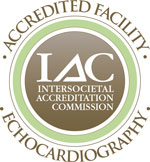Your heart has a big job: To pump enough blood to every part of your body. A healthy heart has no trouble doing this, but in people with heart failure, which is also known as congestive heart failure, the heart can’t pump enough blood to meet the body’s needs. The name “heart failure” is a little misleading. If you have heart failure your heart is still working; it simply isn’t working as well as it should.
Our cardiac specialists can provide you with the full range of care you need for heart failure. Our team of cardiologists, specially trained nurses and other care providers work closely with you to create a fully personalized treatment plan to treat your condition.
Although there is no cure for heart failure, medications, treatments and smart lifestyle choices can help you feel more comfortable and live a longer, more active life.
Give Your Heart a Break: Learn about Heart Failure
If you are one of the 5.7 million Americans living with heart failure, you understand that how hard your heart works. And if you suffer with diabetes, lung disease, coronary artery disease , arrhythmia, high blood pressure and other heart conditions, the impact is even greater.
If your heart weakens, it can cause fluid buildup in the lungs and other parts of the body. This fluid buildup can contribute to the most common signs and symptoms of heart failure, which include:
- Shortness of breath
- Trouble breathing
- Fatigue
- Swelling in the ankles, feet, legs or abdomen
- Swelling in the veins of the neck
What to Expect During Diagnosis
There is no single test used to diagnose heart failure. In addition to giving you a physical exam and talking with you about your medical history, your physician may administer one or more of the following diagnostic tests:
- Electrocardiogram (ECG): This test uses small sensors (electrodes) attached to your chest and arms to record electrical signals as they travel through your heart.
- Echocardiogram: In this noninvasive test, sound waves are used to produce a video image of your heart in motion.
- Cardiac stress test (also known as a treadmill test or exercise EKG or ECG): This test measures how your heart performs in response to exercise or stress by monitoring blood flow and oxygen levels as your heart beats faster and works harder.
- Holter monitor: Worn for one or two days, the Holter monitor is a small appliance that can be attached to a belt or a shoulder strap. Several electrodes placed on the chest connect to the monitor, which records heart rhythms.
- Chest X-ray: This test can show whether your heart is enlarged and whether you have fluid in your lungs.
- BNP blood test:This test measures the amount of a hormone in your blood known as BNP, which increases in people with heart failure.
- Doppler ultrasound: This is a test that uses sound waves to learn more about how your blood is flowing through your heart and to your lungs.
- Nuclear heart scan: During this test, you receive an injection of a safe radioactive substance known as a tracer. Using special scanners, your doctor can see images of your heart and learn more about how well blood is flowing through your heart.
- Catheterization and angiogram: During this test, a cardiologist guides a catheter (a thin plastic tube) through an artery in the arm or leg into coronary arteries. Dye is injected through the catheter, to make images that can be captured in an X-ray. This test can measure blood pressure and blood oxygen levels and detects blockages that may have to be repaired.
- Cardiac MRI: This test uses magnets and radio waves to create images of your heart as it beats. It can show damage whether heart failure has caused damage to your heart.
Work with a Specialist to Find the Right Treatment
Your treatment options for heart failure depend on the type and severity of heart failure you have and how early heart failure is diagnosed. Treatment strategies include:
- Diagnosing and treating the causes of heart failure: For example, if your heart failure is caused by coronary artery disease, arrhythmia or high blood pressure, you’ll receive treatment or medication for those conditions.
- Improving symptoms: Treating symptoms such as excessive swelling can help you feel better. For example, medications can help lower your blood volume and make it easier for your heart to move blood throughout your body and diuretics can reduce fluid buildup in your lungs and swelling in your legs, ankles and feet.
- Making healthy lifestyle changes: Quitting smoking, improving your diet, being more active and losing weight may help relieve symptoms of heart failure and improve your outcome.
- Pacemaker:This small device, which is implanted near your heart, sends signals to your heart to help it beat at the correct pace.
- Implantable cardioverter defibrillator: This device, which is implanted near your heart, produces electrical pulses that can correct irregular heart rhythm and reduce the risk of sudden cardiac arrest.
- Mechanical heart pump: This device, which is surgically implanted in your chest, helps your heart pump blood.
- Heart transplant: This surgery, which is reserved for end-stage heart failure as a life-saving intervention, replaces your heart with a healthy heart from a deceased donor.
Improve Quality of Life with Cardiac Rehabilitation
If you have heart failure or any other heart conditions, CMHVI offers cardiac rehabilitation as part of its Cardiopulmonary Rehabilitation Program. Our cardiac rehabilitation is a medically supervised program that helps heart patients recover with an individualized plan that provides evaluation and instruction on physical activity, nutrition, stress management and other health-related areas as needed. Cardiac rehabilitation can make a significant difference in the lives of heart patients.
- Coronary artery disease
- Angina
- Coronary artery angioplasty or stents
- Open heart surgery such as coronary bypass or valve surgery
- Heart failure
- Heart transplantation
We also invite you to join Mended Hearts™, a patient-run support group affiliated with the American Heart Association that offers support and encouragement through its visiting program, monthly meetings and educational forums. To learn more, call 207-795-8230.




